Many Voices: The Similarities Between Authors and Their Narrators

This is the seventh installment in a column highlighting Asian American writers/books. It is important that we start acknowledging that Asian American experiences are the stuff of literature, of music, of movies, of culture, and that we start supporting those efforts and spreading word of those efforts far and wide. I read hardly any Asian American writers when I was in elementary school, or middle school, or high school, and it was only in college that I found voices that spoke for the importance of minorities, that made me understand that my experiences were worth something.
What follows is a conversation with authors Catherine Chung and Kirstin Chen, exploring the topic of similarities between authors and their narrators and what that has to do with anything.
In Chen’s debut novel, Soy Sauce for Beginners, Gretchen Lin leaves her heart (or at least her floundering marriage) in San Francisco, moves back to her childhood home in Singapore and finds herself face-to-face with the twin headaches she’s avoided her entire adult life: her mother’s drinking problem and the machinations of her father’s artisanal soy sauce business. Surrounded by family, Gretchen struggles with the tension between personal ambition and filial duty, but still finds time to explore a new romance with the son of a client, an attractive man of few words. When an old American friend comes to town, the two of them are pulled into the controversy surrounding Gretchen’s cousin, the only male grandchild and the heir apparent to Lin’s Soy Sauce. In the midst of increasing pressure from her father to remain permanently in Singapore—and pressure from her mother to do just the opposite—Gretchen must decide whether she will return to her marriage and her graduate studies at the San Francisco Conservatory, or sacrifice everything and join her family’s crusade to spread artisanal soy sauce to the world.
Chung’s Forgotten Country was published in 2012, won an Honorable Mention for the 2013 PEN/Hemingway Award, and was picked for Booklist‘s Top 10 Debut Novels of 2012, and Bookpage’s and The San Francisco Chronicle‘s Best Books of 2012 lists. The night before Janie’s sister, Hannah, is born, her grandmother tells her a story: Since the Japanese occupation of Korea, their family has lost a daughter in every generation, and Janie is told to keep Hannah safe. Years later, when Hannah inexplicably cuts all ties and disappears, Janie goes to find her. Thus begins a journey that will force her to confront her family’s painful silence, the truth behind her parents’ sudden move to America twenty years earlier, and her own conflicted feelings toward Hannah.
Matt: I know you both well enough to know there are some surface-level similarities between you and your narrators. Where do you end and your narrators begin (or vice versa)? Can you tell us about some of the similarities and differences, ones you get asked about or ones you would like in particular to point out?
Cathy: Similarities: We’re both human. We are both, to varying degrees, products of my imagination. Differences: She lives in a book, and before that, she lived in my mind. As for me, I live in this world, as far as I know.
Questions I’ve been asked about the similarities and differences between us: well, I’ve been asked about how we’re both Korean-American women, I’ve been asked about whether or not I share certain other experiences with her–whether I’ve lost a parent, whether I’ve ever encountered racism, etc… and while the answers to these particular questions are yes, I never feel totally comfortable with what the questions or their answers might be taken to suggest.
I tend to get impatient with such comparisons because they’re not terribly interesting to me. Sometimes I use things from my own life and give parts of myself over to characters or plot in service of the story. All writers do this, and it’s a deeper kind of sharing done in service of the story, but neither that gesture nor the material are the story itself.
Kirstin: My narrator and I share many characteristics. We’re both Singaporean women who moved to the US for school and eventually settled in the US. We’ve both assimilated relatively seamlessly into American society. We both feel at home away from our birthlands. But one of Gretchen’s defining characteristics is her shiftlessness—I know that word has negative connotations, but I don’t mean it negatively. I’m interested in how content she is to build her life around someone else, and this part of her interests me because it’s so different from who I am.
Matt will no doubt recall our beloved grad school professor Margot Livesey’s advice on how to craft characters so vivid they walk off the page and “take up residence” in the reader’s imagination. Her rule of thumb: every character should have something that they absolutely share with the author, and also something they absolutely do not share with the author—some area of their life, or some experience through which the author can let her imagination run wild. I try to think through Margot’s advice with every character I write.
Matt: Do people assume you are your narrators? Is this at all a common question/topic?
Cathy: I think readers are often surprised to discover that my life actually doesn’t line up with that of my narrator at all. I don’t have a sister, for instance. I was born in America. The circumstances of my family coming and living here were quite different than that of the family in the book–we’re not cursed, we weren’t escaping from anything, etc… These are the kind of questions I get asked a lot, and you know, I think curiosity about the degree to which the two line up is probably pretty natural, and is born of the intimacy a book might make you feel coupled with a desire to understand the mind you’ve just spent so much time with. That said, that kind of passing curiosity isn’t the same as real engagement in a book or with an author, and I get particularly uncomfortable when it’s assumed the narrator and I are the same person. When I get drilled about what we have in common I start to feel very awkward and divided–as if I’m being asked to gossip about myself.
Kirstin: Yes, readers assume I am my narrator all the time. My book cover depicts the back of a young woman’s head, and I’ve actually been asked if it’s a picture of me! Additionally I’m often asked if my family owns a soy sauce factory—they don’t. Like Cathy, I am rankled by that assumption, even as I wholly understand where it’s coming from. What I find interesting is how readers sometimes try to draw parallels between me and my narrator as a way of complimenting the book. For instance, I sometimes hear a variation of, “The soy sauce business in your book is so realistically portrayed that I can’t believe you didn’t grow up around soy sauce.” And while I’m grateful for any kind of reader engagement with my book, I do think that fixating on what’s factually true and what isn’t misses the point of reading novels in the first place. For now, I usually smile and say, “I wish I had a soy sauce factory in my family. It would have saved me a whole lot of research.”
Matt: How can this question in the readers’ minds, if it is there, be helpful or not to the narrative? I mean, can the author use this in some way? Does it work against the author in any way?
Cathy: I think this question has less to do with the writing of the narrative (when the writing is going well) than the reading of the narrative. Which is not–at some point–my job to be involved with. And to tell the truth, I don’t even think the question has much to do with the reading of the work, but comes into play sometime afterwards, after the reader has completed the book.
I totally understand it as an impulse–and to follow up from my last response, I think it’s actually more than just curiosity at play. As a gesture, the question of whether or not the author is the narrator is a way of connecting the fictional world to the real world–a way of seeking a bridge between the two, and saying, but it was true because this part really happened. But as an author, I’m hoping for something deeper. So for me, at first, it’s all about writing the story, and figuring out what it is.
I need to get that right, to figure out the story for myself, and push myself beyond what I already know. At that moment, I am not just the writer, but very much my own and only reader. And after I’m done with that part, with my part of it, what happens next happens in the minds of the other readers. And what I’m hoping for is an emotional response and intellectual engagement–the connection I feel when I read a book–that shared experience of discovering a story, of merging my imagination with someone else’s. What I’m interested in is not the bridge between the fictional lives I’ve written and my own, but the bridge between the mind that wrote the book and the mind that reads it. Because that connection is so much more exciting.
Kirstin: I very much agree with what Cathy said about the conflation of author and narrator happening after the reader has completed the book as a means of connecting the fictional to the real. And I do think the conflation works against the author by calling into question her capacity to imagine and create—even as the factual details are used to somehow validate the whole story. But I also view this as an occupational hazard that is beyond my control and, if given too much weight, can actually hinder my writing.
Matt: I know this may come off as leading–maybe it is–but do you think similarities between author and protagonist is a question that is asked more frequently of women writers? Of minority writers? I’m thinking in part of how the immigration story seems often to be read as the author’s immigration story, whether or not the author immigrated.
Cathy: Do you mean the question of how something is autobiographical? I think it’s an assumption that’s made about women and minority writers and their work more often, and one that reframes the way their work is approached and engaged with. So the question isn’t so much “is this book autobiographical to your own lived experience” as it is, “how is this autobiographical to your lived experience as a woman or as a minority.” Which is a totally different thing, and which rankles.
And it’s a habit, I think, that our society or culture has of saying people who are marginalized in whatever way are defined by that marginalization, that the only thing they have of interest to discuss is that of their difference: the universal is covered by somebody else. But why shouldn’t our experience also speak to the universal human experience? It should, it does. Because the thing is, we are more than our genders or our races or our paychecks–we are all more than the facts of our lives. And to ignore or deny that is a way of trying to deny certain people the value of their own experiences or a certain kind of freedom in their imaginations. On the flip side, it’s a way of excusing ourselves or letting ourselves off the hook when reading literature by people with whom we don’t want to too closely relate to. It’s a distancing mechanism, and that’s so sad because for me, the thing about fiction that is so beautiful and actually sacred is that it demands a sort of radical empathy from us. It says no matter who you are, you can share the experience of these other people who seem, on the surface to be nothing like you. It invites you to imagine all these different worlds, and then to live in them for a while–all these different people you could be and love, and to broaden your perspective and heart.
So to me, the expectation that work written by women or minorities must be representational, because their experiences aren’t included in the kind that speak to the universal human experience–is one of those quietly devastating beliefs that needs to be challenged and overturned. It presupposes that our experiences are not rich enough, or deep enough, or varied enough to warrant that sort of fictional exploration in which new worlds and lives are created. And it does so much damage not only to those that expectation is levied against, but also to those who hold it. It also builds walls between us, cuts us off from each other, and as a notion it tries to limit the wholeness of the lived experience.
As a writer and a reader, I feel like we should always be trying to work against that. The characters I’m interested in live, they move, they captivate–because they are allowed a certain mystery, to exist beyond our imaginations, to suggest rather than demonstrate or explain. They’re not asked to act as tour guides for a certain kind of canned experience, pointing out all the advertised landmarks along the way, but allowed the full complexity of their lives, which as readers we are invited to share. Labels are so dangerous because they are often made to double as a sort of cage, and it seems to me that one of the purposes of art or literature is to break those cages down. I feel like the kind of literature I’m interested in doesn’t try to define or set limits or try to “speak for” certain groups of people or experiences, but rather encourages you to expand what you think is possible, and where you set your horizons, and forces your heart and mind to reach past what you know.
Kirstin: I’m struggling with this question, in part because I don’t think of my novel as an immigration story, even though it’s often called that. I think of it as an expatriate story about a Singaporean woman who builds a life in America away from her birthland—closer to say, stories written by the Americans living in Paris in the ‘20’s—and then has to give up that life and return home. Perhaps in some ways this gets to the heart of the problem? Stories about foreigners—particularly non-Caucasian ones—living in America get described as immigrant narratives, while stories about Americans living in foreign lands are expatriate narratives. To get back to what Cathy said, isn’t the tendency to lump these minority stories together just another example of society failing to acknowledge the depth, richness and variety of the experiences of minority writers?
Matt: Kirstin, your book takes place largely in Singapore–were you thinking more of the American experiences Gretchen has, and her life there (here)? I guess I thought of the book more as a Singaporean woman learning how to rebuild her life in Singapore rather than be an expatriate?
Kirstin: Yes, I was thinking of how Gretchen’s time in America has influenced her identity as a long-term expat and how that identity complicates her return to her homeland.
Matt: I’ve been noticing this trend lately–maybe it’s not a trend?–of “Asian American” novels where, instead of those immigration stories that were so popular before, the protagonists start in America and go back to their countries of origin or ethnicity. Reverse-immigration, or something. Have you noticed this? I talked with Aimee Phan earlier for this column about how her book did this. What do you think this suggests, if anything?
I guess I mean: In Cathy’s book, Janie and her family go back to Korea when her dad is sick. This seems important thematically, that they return. The book is called Forgotten Country. Maybe the return is something that I, in particular, think a lot about, as an adoptee. But I feel like more Asian American novels used to be the story of Asian families coming to America, or just arrived, or adapting to life, etc. Now I see more AA novels about families that have already lived their lives here and go “back” for some reason, whether on a trip or for good. Is that just because more Asian American authors are of later generations now, or does it say something about a desire for one’s country of ethnicity, or does it say something about some lack felt in America? I mean, I’m just throwing these things out there, but I’d love to hear both of your opinions.
Kirstin: I’ve certainly observed this in real life—American-born-and-bred Asians moving to their countries of ethnicity in adulthood to build careers and families, so it makes sense that it’s appearing more in fiction.
But Singapore is different from, say, India or China or Vietnam—countries whose economies have grown rapidly in recent years. Singapore has been a relatively prosperous country for quite some time, so for several generations now, young Singaporeans have gone abroad for university with the intention to return home once they’ve completed their educations. Almost all of my cousins came to the US for college and they’re back home; the same goes for many of my childhood friends. I myself have settled in San Francisco and am married to an American, but I still hold a Singapore passport and think of myself as a long-term or permanent expatriate. My narrator, too, identifies as a long-term expatriate in America, and while her return to Singapore is complicated and fraught for a number of reasons, unlike “reverse immigrants”, she’s returning to where she was born and bred and reuniting with her family, as opposed to leaving all that behind.
Cathy: So the books by Asian American authors I love and that have meant a lot to me have never been about “coming to America” or “adapting to life”, as I see it. The Woman Warrior, Native Speaker, A Gesture Life, Edinburgh, When the Emperor Was Divine, The Joy Luck Club–were exhilarating to me when I read them because they were actually making the opposite move. “No Name Woman” for example, is not about an immigrant adapting to a new culture: that story, the ghost, the silence, the crooked streets, the false names–these are things Maxine Hong Kingston–the immigrant author–injected into American literature, and they will endure. It is American literature and culture that was changed by her.
And I would argue the same of all the other books that I listed: what I love about them is how they fearlessly bring different languages, folktales, legends, histories, family dynamics, preoccupations and metaphors to bear upon American (and really, world) literature. They refuse to be small. They are incredibly deep and far reaching individually and collectively about the questions they raise about war, about personal and national mythologies, about morality, about friendship, about the costs of love, citizenship and nationality, belonging, and the complexity of being alive in this world.
I feel skittish about entering an opinion about the “trend” toward reverse immigration stories, because I feel like that particular kind of speculation is entering dangerous territory. I think we find the answer to the question of why a specific book makes such a move by doing close textual analysis of the individual book, and we can’t generalize over a group of books without that same attention or we risk falling into the whole all-looks-same mentality.
In terms of my own book, yes, the family does return to Korea. All my favorite stories are full of returns: not necessarily to a home country or land, but to specific places, ideas, to states of being, to certain feelings–to important relationships. Aren’t we always circling the same things? You mention the title, Forgotten Country: well, I was interested in writing about a family that was divided and came from a country that is divided, and beyond that, from a history of division. And I was really interested in the idea that trauma can be forgotten–for instance that in America the Korean War is called the Forgotten War. What an incredible thing to forget! And I was interested in how we talk about North and South Korea all over the world, and it’s as if we’ve all forgotten that Korea was once a united country before it became North and South.
It seemed to me to be an incredible metaphor for lost unity, for all the ways in which we can lose the places we are from, or the connections we once had to people we love. And so in writing about these things, and sending my characters back to this place that no longer exists (if ever it did), I was really trying to write about loss and the longing for wholeness.
Photo credits go to Sarah Deragon (Chen) and Ayano Hisa (Chung).

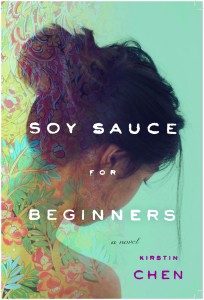
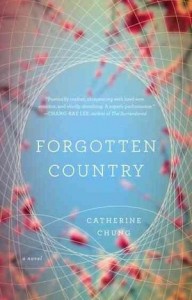
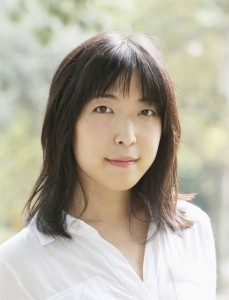
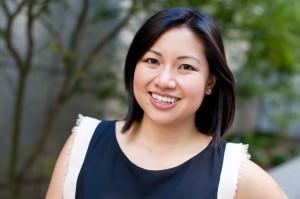

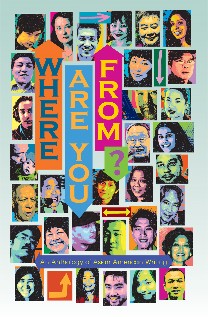


Pingback: Many voices: The similarities between authors and their narrators | Kitaab